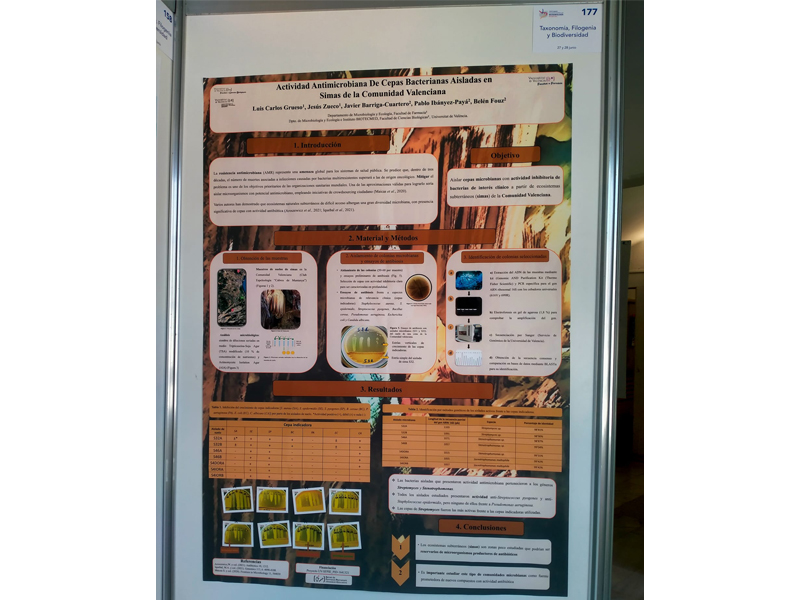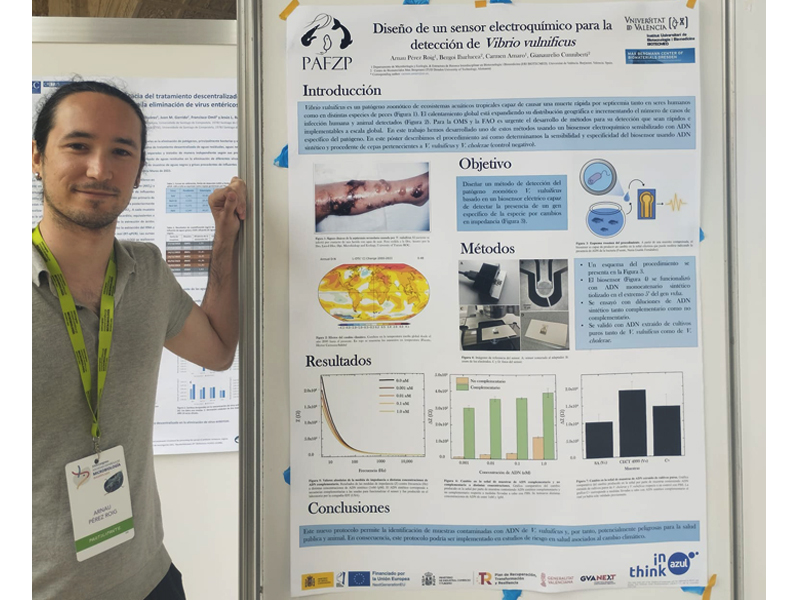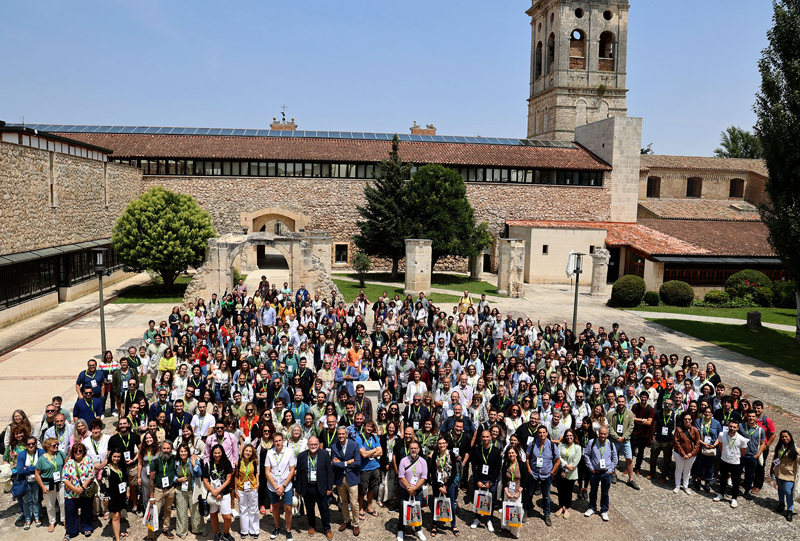
Arnau Pérez and Belén Fouz attended the XXIX Congress of the SEM 2023 held in Burgos, where they presented part of their work carried out throughout this year in the group as well as Micromundo València program. In addition, Arnau's research was very well received at the congress, and his poster was awarded the prize for the best poster on Microbiology of the Aquatic Environment.
At the end of last June, two members of our group (Dr. Belén Fouz and PhD student Arnau Pérez) had the pleasure of attending the XXIX Congress of the Spanish Society of Microbiology in Burgos, where they presented different posters with work done by the group as well as in the Micromón Valencia program.
On the one hand, Belén Fouz presented a poster on the search for bacteria in chasms (cavities, usually in calcareous rock, which open outwards through a well, vertical conduit or steep slope, and originated by a karstic erosive process or collapse of the roof of a cavity, through which water seeps or percolates to lower levels. Source: Wikipedia) of the Valencian Community. Thus, bacteria with the ability to produce natural antimicrobial substances were sought, with the possibility of their future use as antibiotics. This work was carried out in collaboration with Jesús Zueco, from the Faculty of Pharmacy of the UV, who belongs to the Teaching Innovation group of the University of Valencia.

On the other hand, Belén also presented two other posters, related to teaching and/or dissemination. The first one, belonging to the Consolidated Group of Teaching Innovation in Microbiology, whose activities are related to teaching and dissemination of Microbiology, focused on the implementation of the international programs Small World Initiative, Tiny Earth and Microworld in different secondary schools located in the Valencian Community. The second focuses on the Teaching Innovation Project. This initiative "Divulsuperbac" (DSB) is coordinated by the UV (Belén Fouz and Sergi Maicas) and implemented in the FORTHEM Alliance of European universities. Its main objective is to raise public awareness of the health problem posed by bacteria resistant to multiple antibiotics (superbugs). This poster displays 14 infographics curated by university students in secondary schools, with complementary activities (short lectures, interactive games, among others).
Finally, Arnau Pérez presented part of the results of his doctoral thesis. Specifically, he focused on those corresponding to the design of an electrochemical sensor for the detection of Vibrio vulnificus, an important zoonotic marine pathogen whose global distribution is expanding due to climate change.
Currently, the main technique for detection and diagnosis of V. vulnificus is the polymerase chain reaction (PCR). Unfortunately, this method requires a lot of time, human resources and trained personnel to perform, which makes its application difficult, especially in developing countries. In contrast, electrochemical sensors allow the construction of detection platforms at low cost, with high sensitivity, miniaturization and their use does not require specialized personnel.
This sensor is the first electrochemical biosensor design described for this pathogen, designed during a 3-month stay in Dresden (Germany) in collaboration with the Biomaterials Center of the Technical University of Dresden, under the supervision of Dr. Bergoi Ibarlucea in the laboratory of Prof. Gianaurelio Cunniberti. And its fine-tuning was performed in our laboratory, under the supervision of Dr. Amaro. This sensor uses species-specific DNA strands functionalized on a gold surface to detect impedance changes produced specifically by adding samples containing pathogen DNA to its surface. This would theoretically allow detection of the presence of V. vulnificus in both environmental and clinical samples.
Arnau's research was very well received at the congress, and his poster was awarded the Prize for the best poster on Microbiology of the Aquatic Environment.

Apart from the poster exhibitions, Belén and Arnau had the opportunity to attend many talks on the latest advances in the study of microbiology that are being carried out in our country, from the development of bacteriophage therapies or antibiotic cocktails to the study of the microbiome of plants or the phylogeny of all kinds of pathogens and the new mechanisms described for the emergence of resistance. Particularly noteworthy was the talk by Dr. José Rafael Penadés, from Imperial College London, on the molecular basis of the transfer of mobile genetic elements involved in pathogenicity and lateral transduction. As well as the closing conference given by Dr. Jerónimo Rodríguez Beltrán, from the Ramón y Cajal University Hospital in Madrid, on the emergence and spread of antibiotic resistance.
"I had never attended a national congress before and the experience has been enriching and very pleasant. I have had the opportunity to rub shoulders with people who, like me, are starting their careers in the world of research, as well as with great eminences of microbiology and to learn many things of great interest that have caught my attention that I would probably never have discovered if I had not attended the congress. I have really enjoyed both the congress and the city of Burgos and the rest of the activities, I am very glad I was able to attend." Arnau Pérez Roig.











